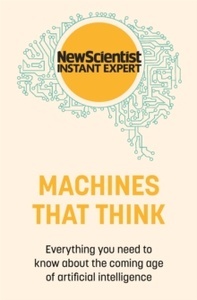Machines that Think : Everything you need to know about the coming age of artificial intelligence

Editorial Hodder & Stoughton
Fecha de edición marzo 2022 · Edición nº 1
Idioma inglés
EAN 9781529381955
288 páginas
Libro
encuadernado en tapa blanda
Dimensiones 196 mm x 128 mm
Resumen del libro
Sometime in the future the intelligence of machines will exceed that of human brain power. So are we on the edge of an AI-pocalypse, with superintelligent devices superseding humanity, as predicted by Stephen Hawking? Or will this herald a kind of Utopia, with machines doing a far better job at complex tasks than us? You might not realise it, but you interact with AIs every day. They route your phone calls, approve your credit card transactions and help your doctor interpret results.
Driverless cars will soon be on the roads with a decision-making computer in charge. But how do machines actually think and learn? In Machines That Think, AI experts and New Scientist explore how artificial intelligence helps us understand human intelligence, machines that compose music and write stories - and ask if AI is really a threat. ABOUT THE SERIESNew Scientist Instant Expert books are definitive and accessible entry points to the most important subjects in science; subjects that challenge, attract debate, invite controversy and engage the most enquiring minds.
Designed for curious readers who want to know how things work and why, the Instant Expert series explores the topics that really matter and their impact on individuals, society, and the planet, translating the scientific complexities around us into language that's open to everyone, and putting new ideas and discoveries into perspective and context.
Biografía del autor
La revista "New Scientist" lleva 60 años informando sobre la sorprendente creatividad de la naturaleza y del ser humano. Se ha convertido en la publicación científica semanal más vendida del mundo gracias al modo en que trata los descubrimientos e inventos más recientes, incluyendo su relevancia y sus implicaciones. <br> <br> Graham Lawton<br> Editor ejecutivo de "New Scientist". Es autor y editor de "El origen de (casi) todo", libro ilustrado de New Scientist anterior a este y publicado en Alianza Editorial. <br> <br> Jeremy Webb<br> Antiguo redactor jefe de "New Scientist". En la actualidad, se dedica a escribir libros científicos para el gran público. <br> <br> Jennifer Daniel<br> Directora creativa en Google, colabora con regularidad con el "New York Times" y el "New Yorker".








